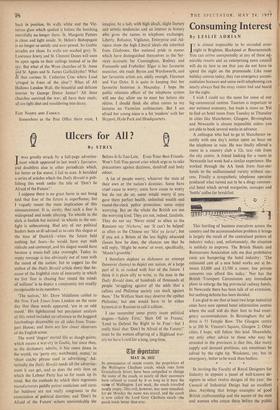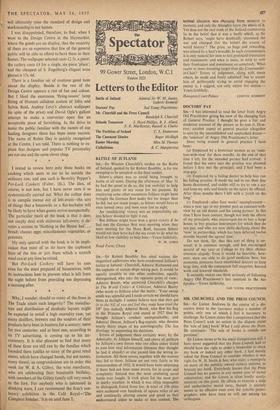Consuming Interest
By LESLIE ADRIAN T is almost impossible to be stranded over- Inight in Brighton, Blackpool or Bournemouth. You can arrive unexpectedly at any of these adj mirable resorts and an enterprising town council will do. its best to see that you do not have to spend the night on the promenade. Like most holiday centres today, they run emergency accom- modation bureaux and some swift telephoning can nearly always find the stray visitor bed and board for the night.
I wish I could say the same for some of our big commercial centres. Tourism is important to our national economy, but trade is more so. Yet to find an hotel room from Tuesday to Thursday in cities like Manchester, Glasgow, Birmingham and Newcastle is almost impossible unless you are able to book several weeks in advance.
A colleague who had to go to Manchester re- cently with one day's notice spent an hour on the telephone in vain. He was finally offered a room in a country club a 12s. taxi ride from the city centre. A friend looking for a room in Newcastle last week had a similar experience. She worked through the AA book from four-star hotels to the unilluminated variety without suc- cess. Finally a sympathetic telephone operator produced what turned out to be a dingy commer- cial hotel which served margarine, sausages and `bottle' coffee for breakfast.
This hurtling of business executives across the country and the accommodation problem it brings is largely the result of the centralised pattern of industry today; and, unfortunately, the situation is unlikely to improve. The British Hotels and Restaurants Association tells me that prohibitive costs are hampering the hotel industry : `The estimated cost of a new hotel works out at be- tween £3,000 and £3,500 a room; few private concerns can afford this today.' Nor has the British Transport Commission any immediate plans to enlarge the big provincial railway hotels. In Newcastle there has been talk of an extension, but nothing definite has been decided.
I am glad to see that at least two large industrial cities have now opened hotel information centres where the staff wilt do their best to find emer- gency accommodation. In Birmingham the ad- dress is 55 Temple Row. The Glasgow centre is at 200 St. Vincent's Square, Glasgow 2. Other cities, I hope, will follow this lead. Meanwhile, my only other advice to those who may be stranded in the provinces is .that this, like many supply and demand problems, can sometimes be solved by the right tip. Weakness, yes; but in emergency, better to be weak than bedless.
In inviting the Faculty of Royal Designers for Industry to appoint a panel of well-known de- signers to select twelve designs of the year, the Council of Industrial Design had an excellent idea. Anything that brings examples of good British craftsmanship and the names of the men and women who create them before the public will ultimately raise the standard of design and workmanship in our homes.
1 was disappointed, therefore, to find, when I went to the Design Centre in the Haymarket, where the goods are on display, that the majority of them are so expensive that few of the general public will be able to afford to have them in their homes. The wallpaper selected costs £2 5s. a piece; the cutlery costs £4 for a single, six-piece 'place; and the cheapest of S. Fogelberg's elegant wine glasses is 15s. 6d.
There is a familiar air of cautious good taste about the display. Beside it the rest of the Design Centre appears a riot of fun and colour. But I liked the enormous 'flying-saucer' lamp fitting of filament cellulose acetate of John and Sylvia Reid, Audrey Levy's abstract wallpaper (in spite of the price) and David Ogle's gallant attempt to make a convector open fire an acceptable piece of furnishing. In the drive to make the public familiar with the names of our leading designers there has been some success. The name of Robin Day is quickly recognised at the Centre, I am told. There is nothing to ex- plain that designer and popular TV personality are not one and the same clever chap.
I intend to review here only those books on cooking which seem to me to be outside the ordinary run; and one such is Beverley Pepper's Pot-Luck Cookery (Faber, 18s.). The idea, of course, is not new, but I have never seen it so systematically carried out. What the author does is to compile menus out of left-overs--the sort of things that a housewife or a flat-bachelor will be likely to have when guests arrive unexpectedly. The particular merit of the book is that it does not simply deal with elaborate left-overs; it de- votes a section to 'Nothing in the House but'.. . bread; cheese; eggs; miscellaneous vegetables; or potatoes.
My only quarrel with the book is in its impli- cation that most of us do leave the cupboard bare of the tins or jars from which a scratch meal can at any time be raised.
But Pot-Luck Cookery will have its uses even for the most prepared of housewives, with its instructions how to prevent what is left from the night before from providing too depressing a morning after.
* *
Why, I wonder, should so many of the firms in The Trade attain such longevity? The manufac- ture and distribution of alcoholic liquors might be expected to entail a high mortality rate; yet many distillers, brewers and the vendors of their products have been in business for a century; some for two centuries; and at least one, according to its TV advertising, is coming up to his ter- centenary. It is also pleasant to find that many of these firms are still run by the families which founded them (unlike so many of the great retail stores, which have changed hands, but not names, many times); so congratulations are in order this week for W. & A. Gilbey, the wine merchants, who are celebrating their hundredth birthday, with members of the Gilbey family still very much to the fore. For anybody who is interested in drinking ware, I can recommend the firm's cen- tenary exhibition in the Caf6 Royal--`The Compleat Imbiber.' It is on until June 7.































 Previous page
Previous page